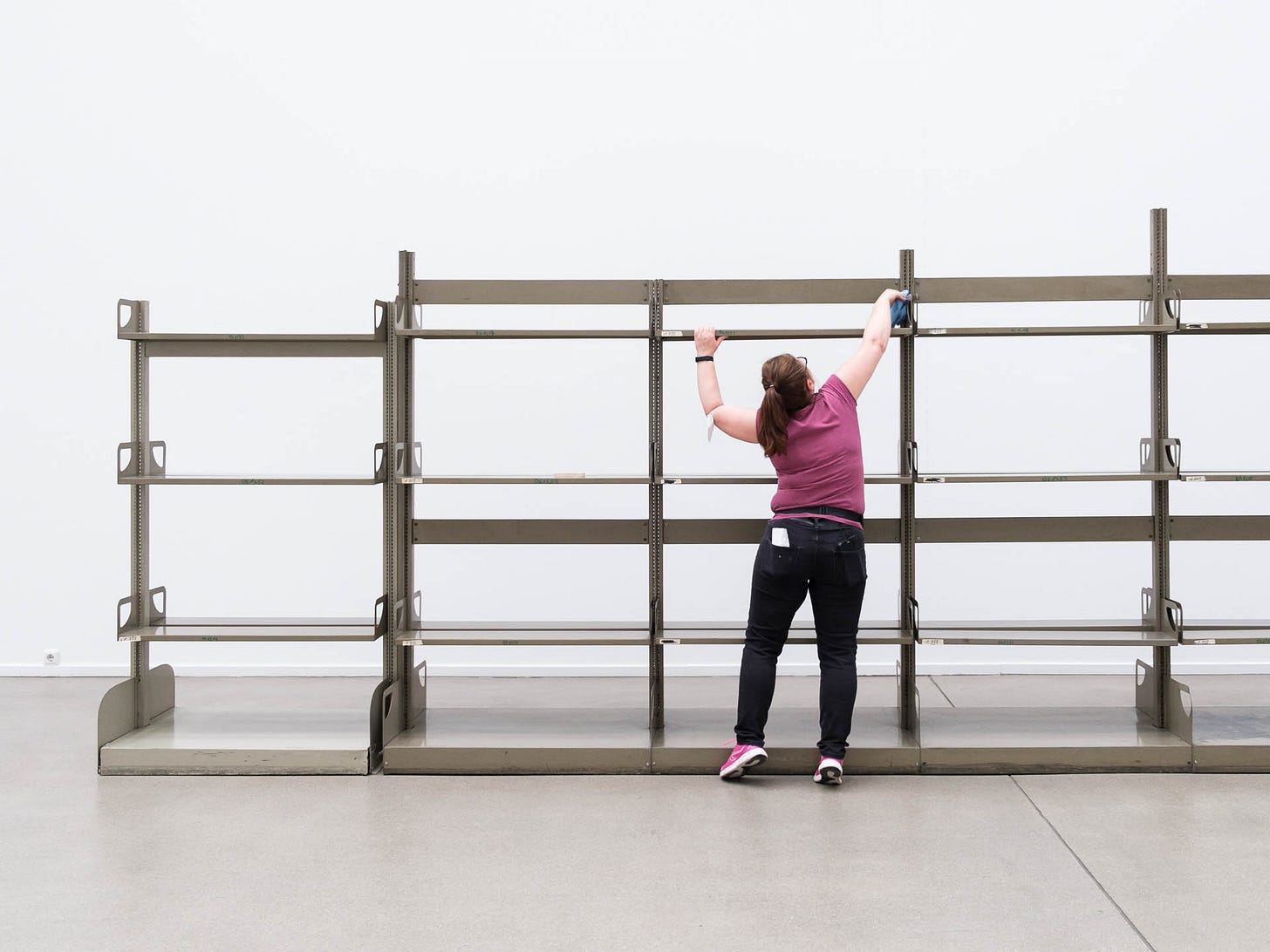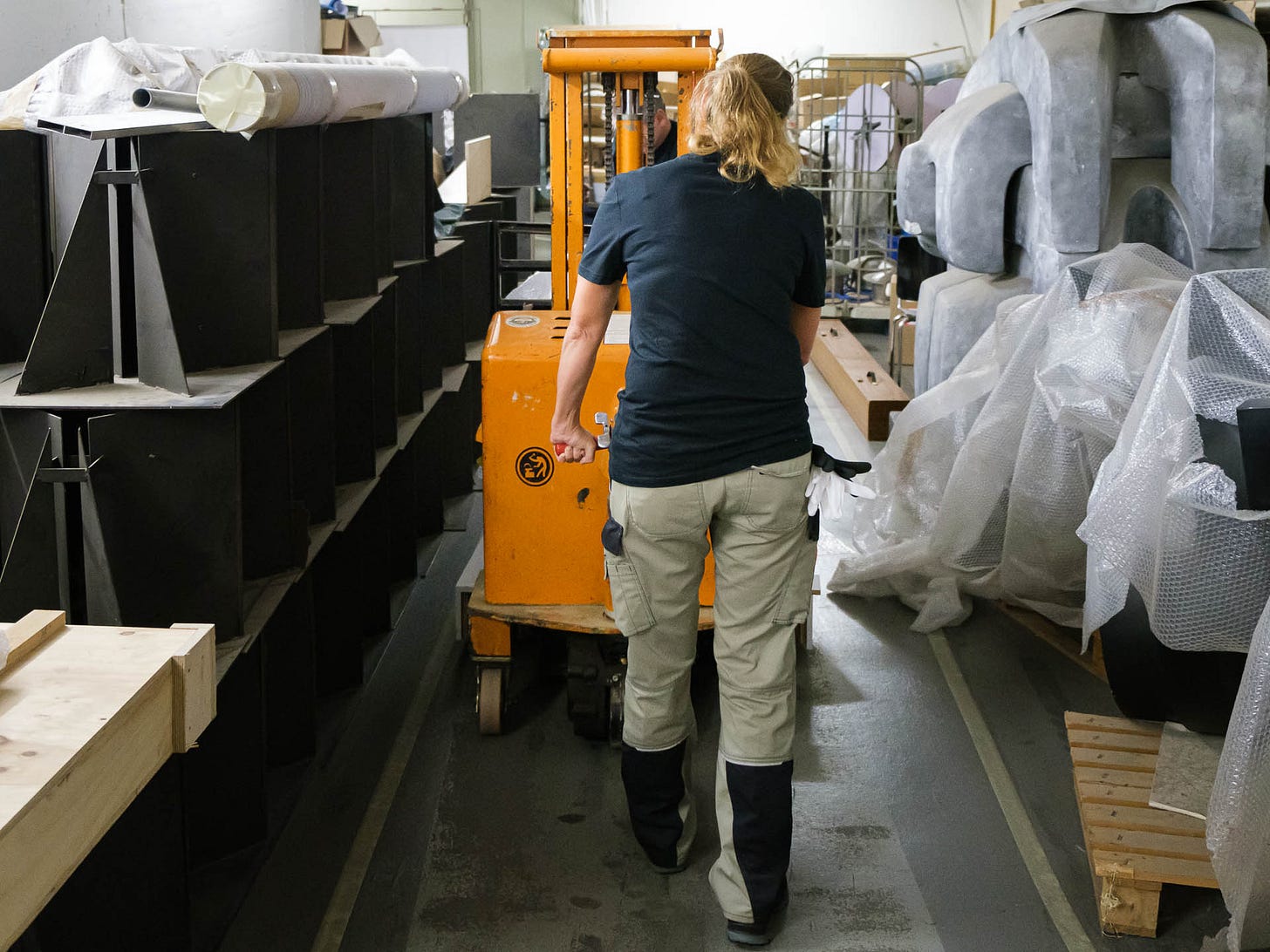Disclaimer: Wir, die Mitarbeiter*innen des Kunstmuseum Bochum, sind ein internationales Team und gestalten unsere Kommunikation dementsprechend so offen wie möglich. Deshalb haben wir uns für die englische Sprache entschieden für unsere Weeknotes. Übersetzungen sind in deutscher Sprache auf unserem Website-Blog hier verfügbar.
We at the Kunstmuseum Bochum are an international team and want to keep our cooperations international as well and as open as possible. Therefore, we decided to write our weeknotes in English. German translations are available on our website-blog, right here.
Week 18
The pandemic still not being a thing of the past, it hit our team last week and had us skip a post. We’re happier than ever to welcome you back! For the “INVENTORY” talk on 08.03.2023 we had filmmaker Claudia Richarz as our guest. On the occasion of International Women' s Day we spoke about her film “Aufräumen” („Tidying up“), a portrait of Helke Sander, which will premiere at the International Women's Film Fest in Dortmund on 22.04.2023. Bringing her experience and excerpts from the film together with our INVENTORY, the conversation touched upon questions around feminist perspectives on tidiying up, care and maintenance. And again, listening to others was helpful to better figure out, what it is, we are actually doing in the INVENTORY. This week we’re diving in with Eva, our curator and deputy director.
A team member cleaning the shelves in the exhibition “INVENTUR” - © H.Holtgreve, 2022
1. “I was a bit shocked when I saw how much there is to do here”
…said Claudia Richarz as an opening remark to the conversation, after having visited the “INVENTORY”. As part of the process two people, namely Nora Patberg and Christa Appel, are and have been doing a big part of the inventory work for almost five months now. Whereas for years there hasn't been any staff for this particular work of maintaining the databank of the collection. It was always something to be done on the side – by the curators, next to planning and making exhibitions, programs and many other tasks.
2. There is a lot more to tidying up than clean floors
Helke Sander, protagonist of Claudia Richarz' film “Aufräumen”, is 86 years old and a filmmaker herself. She became an important figure in the beginnings of the new feminist movement in West-Germany, first through a speech she gave in 1968 at the leftist students (SDS) congress in Frankfurt. It sparked and engaged controversy that led to the founding of the first women's groups at that time. Her central message was that the private is political and revolution starts at home, with the question of who cleans and takes care of the children, and not just through political struggles. Sander’s first film “Die allseitig reduzierte Persönlichkeit” (1978) follows a photographer who is also a single mother (played by Sander herself) and is still considered an important milestone in feminist film history. In 1974 she founded Frauen und Film, the first European magazine for feminist film criticism. „So for me it was important to honour her, not just as a great filmmaker and film critic, but also a feminist.“ Richarz was also Sander’s student and collaborated on several of her films.
The title “Aufräumen” came from Sander herself. First Richarz thought that it would be a bad choice, people wouldn't want to watch a film about tidying up, seeing it as boring. But in the end, she was convinced. „When we started shooting for the film, Helke was constantly tidying up, for years. While I was trying to raise funding for the film, she was again always tidying up. After deciding that this should become a central theme of the film I was worried, she might be done before I got the money to actually start shooting.“ Luckily this did not happen and scenes of Helke Sander tidying up in her flat now serve as a connecting element of the film, offering entry points into different aspects of her life. The decision to call the film “Aufräumen” is a way of affirming the idea that the private is political
3. Cleaning as a feminist practice
One remark coming from the audience was that it is not particularly female to clean up, as there is also this stereotype of the neatly ordered library or hobby basement of men. Another guest added that creating order as a form of having and executing power is actually usually more a patriarchal strategy. Of course, every human in their life is or should be in some way tidying up something sometimes. So, another guest suggested that it might rather be about having to clean up for others, as reproductive work that is less visible and as the daily routine. The film “Alle Tage wieder, Let them swing!” (1974) by Margaret Raspé, which can be seen in the “INVENTORY” exhibition, is an example of addressing this. It shows the perspective of the filmmaker while washing a huge pile of dishes over 20 minutes. So maybe we could say: Cleaning or tidying up is not necessarily feminist, but making it visible and giving it the attention and appreciation it needs, is. Even if it is often kept out of sight, it is nothing that happens by itself. And now for Richarz making a film, looking back into the life of Helke Sander appears as a form of reproductive, or care work. Seeing filmmaking as intergenerational feminist discourse, tidying up can be seen as part of a feminist practice. To acknowledge that it is a work that needs to be done is a way of taking care.
4. How does this join up on the inventory of our collection?
With our “INVENTORY” we’re going in a similar direction. Doing the work of inventorying and tidying up is necessary, but often kept from the visitor’s eyes. We are boldly suggesting, that this kind of maintenance work is not boring, but worth an exhibition. In her “Manifesto for maintenance art” (1969) Mierle Laderman Ukeles writes „My working will be the work“. Similarly, in the “INVENTORY” the museum's staffs working is (an important part of) the exhibition. Whether you now call it feminist or not, something good and important happens, when we understand and narrate ourselves and the institutions we create as vulnerable, as needing care and maintenance. This is very basically human and being able to express this was an important achievement of past feminist struggles.
Tidying up is a way of re-negotiatig order in the process. This is true for everyday life, our inventory, as much as it is for filmmaking. Richarz elaborated on her processes of editing as creating an order. There might be a structure in your head before starting a film, but most of what you plan in the beginning becomes obsolete once you start shooting and actually have your material in front of you. Having these moments of being open for what is actually in front of you, and which order it might be suggesting by itself, is crucial. You might plan to start chronologically, but then you don't want to give a particular piece of information in the beginning of a film, as it might shape the perspective in a wrong way. „It’s very important to label your material right from the beginning, so you find everything later on. And to make backups. In film, this is the job of the data wrangler, but as I had little money, I was doing this job, too.“
5. We have to let go
An important aspect of tidying up also is letting go of things. In film this is easier than in her private life, says Richarz. „The more you get rid of, the better the film becomes.“ You might be sad that certain aspects are not there anymore, but the film as a whole improves a lot. And once something is out, it is out. We discussed a particular scene of the film showing Sander on the 50th anniversary of her famous speech. In this speech, which also happened in Frankfurt, she criticizes the younger feminist movement for being apolitical, centering around pseudo-problems. I, for example, was angry about several things she said. In the film it is followed by a scene showing Sander alone in the train, looking out of the window, which seemed to me like a commentary, making her reflect on the event. Why was it important to not cut this out, but leave the conflictual material in, showing Sander expressing opinions probably several contemporary viewers would disagree with?
Giving space for conflict can be seen as part of a feminist practice. A visitor commented that tidying up also means coming across and being confronted with things you might not like or agree with anymore. Taking things in your hand, moving them around, can be an occasion to re-evaluate, to position yourself anew. When dealing with collections, there might be controversial aspects, or gaps we are not happy about. Similarly, it is important to not erase these conflicts, but through commentary, make them visible.
Richarz decided to share one part of the film with us, showing Sander moving cups in her kitchen cupboard, reflecting: "Tidying up has many meanings. Not only what you actually clean and put away, but it also has something transcendent." Sander refused to further elaborate on what she meant with it and left the interpretation up to us. What would be yours?
Thank you for taking the time to read us! We’ll see you next week for the last edition of our weeknotes. However, we won’t stop making our internal processes visible. If you have some feedback for us, wishes or anything else you would like to share, please write it in the comments or send us an email to c.nies@bochum.de. See you next week!
- EB
Caring for the collection - © H.Holtgreve, 2022
About us:
The Kunstmuseum Bochum is a small art museum in Bochum, Germany, rethinking its collection.
Through these Weeknotes we want to document insights and share thoughts about our ongoing inventory process at the Kunstmuseum Bochum. We call it “process”, not “project” on purpose because beyond a need of order, our collection needs a re-telling of its stories, in all its iterations. For more information, you can contact us at: cnies@bochum.de or if you’re reading this for the first time, join our Substack for regular updates.




